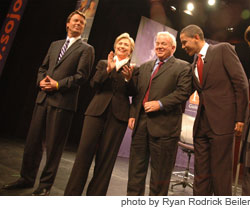 Monday night I attended Sojourners’ presidential candidates forum on Faith, Values, and Poverty, featuring Democrats John Edwards, Barack Obama, and Hillary Clinton. I expected to hear how their faith informed their policies, but I also longed to hear something of the candidates’ stories and their perspectives on theology and ethics. They met my first expectation. But the conversation buoyed me with surprise as to my second hope.
Monday night I attended Sojourners’ presidential candidates forum on Faith, Values, and Poverty, featuring Democrats John Edwards, Barack Obama, and Hillary Clinton. I expected to hear how their faith informed their policies, but I also longed to hear something of the candidates’ stories and their perspectives on theology and ethics. They met my first expectation. But the conversation buoyed me with surprise as to my second hope.
Although all three are Protestants, they represent three discreet traditions. Edwards, born Southern Baptist, left and returned to personal faith; Barack Obama articulated the prophetic hope of the African-American church, himself an adult convert; and Hillary Clinton has been a mainline Methodist all her life. Edwards spoke easily of Jesus (even extending the syllables “Je-ee-sus” in that particularly southern way), Obama extolled the vision of “the beloved community,” and Clinton confessed that she is “private” when it comes to faith (I, too, learned in Methodist Sunday school that faith is “private”) and finds it awkward when others “wear their faith on their sleeve.” In one short hour, they modeled the three great families of American Protestantism: evangelical, African-American, and mainline.
Yet, the differences did not obscure a greater commonality. All three made surprisingly modest claims about faith, stressing the limits of human knowledge of divine things. Edwards spoke of how often he sinned (“several times a day, every day”) and said that he often prayed to know the difference between his own will and God’s. Obama ruminated about Abraham Lincoln’s Civil War meditations on the ambiguity of faith. And Clinton confessed to the superficiality of some of her prayers while asserting the importance of “doing the best with what we know to be true at a given time.” All three extended these perspectives into the realm of politics and policy, articulating a desire to move away from the politics of hubris to a politics of humility.
Clearly unscripted and unplanned, what emerged was a re-articulation of a great American theology: the ironic strain of Protestant faith. In 1952, Reinhold Niebuhr described this part of American religious-political character in his book, The Irony of American History. Irony, as Niebuhr described, is not humor. Rather, it is an understanding that American history was full of unexpected twists, that the most innocent political intentions had often undermined virtue.
“If virtue becomes vice through some hidden defect in the virtue; if strength becomes weakness because of the vanity to which strength may prompt the mighty man or nation; if security is transmuted into insecurity because too much reliance is placed upon it; if wisdom becomes folly because it does not know its own limits—in all such cases, the situation is ironic.”
Irony runs deep in the Protestant soul, finding its original voice in St. Paul, who said, “We know that the law is spiritual, but I am flesh, sold into slavery under sin. I do not understand my own actions. For I do not do what I want, but I do the very thing I hate.”
In recent years, Protestant irony has been in short supply. From both the Religious Right and the current president we have been subjected to a theology of victory, that which Martin Luther once called the “theology of glory,” a triumphal Christianity. No self-reflection, no sense of “I do the very thing I hate,” no anticipation of wisdom turning into folly.
Contrasting the theology of glory, Luther identified “the theology of cross.” Like Niebuhr’s irony, the theology of the cross understands human limitations, recognizes suffering, and acts in humility. It is the way of grace-filled risk, of trusting God—not armies or policies or ideologies or our own righteousness—to bring peace. St. Paul, Martin Luther, Reinhold Niebuhr—all voices of the cross.
These strains—triumphal or ironic, hubris or humility, of glory or the cross—have competed for the soul of American Protestantism since its beginnings. And, as expected, the more modest voices have often been less heard, perhaps because they represent the deepest place of Protestant spirituality. After nearly two decades of certainty, no wonder the Democrats sounded that note on Monday night—and it was refreshing to hear it. I was not only surprised by how well these Democrats spoke about faith, but that they sounded like Reinhold Niebuhr while doing it!
The irony of American history is clearer than ever. As Niebuhr wrote, we are “involved in irony because so many dreams of our nation have been so cruelly refuted by history.” Iraq? New Orleans? The gap between rich and poor? Will we have a political theology of triumphalism or irony? A theology of glory or the cross? Thank goodness we may well have a choice in the next presidential election.

Diana Butler Bass (http://www.dianabutlerbass.com/) holds a Ph.D. in American religion from Duke University and is the author of the award-winning Christianity for the Rest of Us: How the Neighborhood Church is Transforming the Faith (Harper SanFrancisco, 2006).
